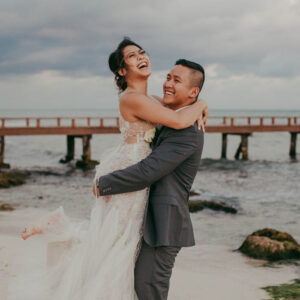
Who Pays for What in a Destination Wedding: Advice and Etiquette
Planning a destination wedding can feel like navigating uncharted waters, especially when it comes to figuring out who covers which expenses.
Between vendor travel fees, guest accommodations, and pre-wedding events, understanding the financial responsibilities can prevent misunderstandings and set expectations from the start. This guide breaks down typical payment responsibilities so you can budget effectively and enjoy your celebration with minimal stress.
The Parents’ Contributions
Similar to a traditional wedding, parents may choose to contribute to a destination wedding. “Who pays for a destination wedding is similar to who pays for a hometown wedding,” says Jamie Chang, a destination wedding planner and designer at Los Altos, California-based Mango Muse Events. “The couple may be paying for the wedding, or the parents are, or both are pitching in. This remains the same no matter where you’re having your wedding.”
Parents often assist with costs related to key wedding events:
- Rehearsal Dinner: Traditionally, this is covered by the groom’s family, but in modern times, it can be paid for by either set of parents or the couple themselves.
- Venue and Ceremony Costs: Whether it’s a beachfront resort or a private villa, the parents or the couple typically foot the bill for the venue, catering, flowers, décor, and other wedding essentials.
- Vendors: Any local or flown-in vendors (photographers, officiants, DJs) are also covered by the family or couple.
It’s important to have clear conversations about contributions upfront, so everyone knows what they are responsible for, avoiding any surprises later on.

The Couple’s Responsibilities
The couple often takes on the majority of the costs associated with the actual wedding ceremony and related events. While you’re not required to pay for everything, there are several areas where your financial contributions will matter.
-
Helping Guests with Accommodations
While you’re not obligated to pay for your guests’ airfare or hotel rooms, doing so can be a kind gesture if your budget allows it. If you can’t cover these expenses, make it clear in the invitation or wedding website so guests can plan accordingly. Some couples might offer to cover a portion of travel costs for close family members or friends who may need financial help to attend. -
Securing Group Rates
Consider locking in group rates at a hotel or resort to make accommodations more affordable for your guests. This is a common courtesy that many couples extend, ensuring that rooms are available at a discount for guests who book early. Likewise, you might want to work with airlines to secure group rates for airfare, especially if many guests are traveling from the same location. -
Organizing Pre-Wedding Activities
Destination weddings often include extra events, such as welcome dinners, sunset cruises, or sightseeing tours. If you’re hosting a group event, like a beach day or a group hike, it’s typically the couple’s responsibility to cover those expenses. However, if activities are optional—like a spa day or wine tasting—you can ask guests to pay their own way, though you’ll still need to handle the organization. -
Covering Vendor Travel Costs
If you’re bringing in vendors from out of town—whether it’s your favorite hair and makeup artist or a photographer—you will need to budget for their travel and accommodations. Some vendors may offer discounted rates if they’re excited about working in a new location, but it’s essential to clarify these costs upfront.

What Guests Are Expected to Pay
Guests attending a destination wedding should anticipate covering most of their own travel-related expenses.
-
Travel and Lodging
“The best way to think about it is that everything they’d pay for on a vacation is what they’d pay for at the destination wedding,” says Chang. This includes flights, hotel stays, and ground transportation. -
Meals and Drinks Outside of Wedding Events
Unless the wedding couple specifies otherwise, guests are expected to pay for meals and drinks that aren’t part of official wedding events. Guests should also be responsible for incidentals like room service, mini-bar charges, and any personal expenses. -
Attire and Beauty
For those in the wedding party, this includes paying for bridesmaid dresses, groomsmen suits, and professional hair and makeup. Couples can offer to cover these costs as a gift, but it’s not expected. -
Additional Entertainment
If the couple offers optional activities like golfing or scuba diving, guests who wish to participate should plan on covering these costs themselves. The couple may suggest fun activities but isn’t expected to pay for them all.

Etiquette Tips for a Smooth Experience
- Communicate Clearly: Make sure to provide all financial expectations upfront. Include details on what you’re covering (or not) in your invitations or on your wedding website.
- Offer Assistance for Those Who Need It: If there’s a close family member or friend who you know can’t afford to come, consider covering their costs discreetly, and handle the conversation with sensitivity.
- Budget Wisely: Destination weddings come with their own unique costs, especially when travel and logistics are involved. Create a detailed budget and make sure you factor in unexpected expenses, like paying for a vendor’s extra baggage fees or last-minute accommodations.
By laying out who’s responsible for what, everyone can focus on the fun aspects of the wedding without worrying about unexpected financial stress.
